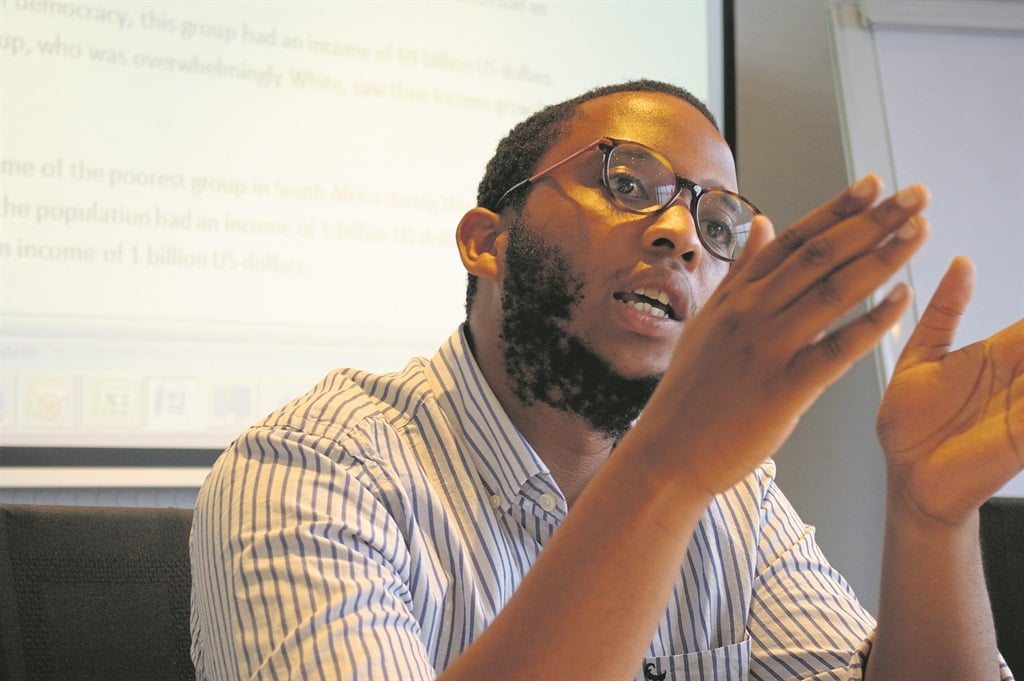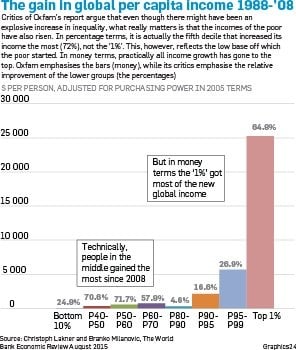
International advocacy group Oxfam this week produced a report on global inequality to coincide with the World Economic Forum (WEF) in Davos, Switzerland, triggering a backlash from a variety of free market think-tanks and professional commentators worldwide.
Oxfam’s major claim is that the 62 richest billionaires have as much wealth as the bottom 50% of the human race combined: about $1.75 trillion (R28.8 trillion).
Apart from attacking that number, detractors also claim that rising global inequality is in fact acceptable, as long as poverty rates are also falling.
To arrive at the figures in the report, Oxfam compared the wealth of the top members of Forbes’ annual rich list, which outlines the estimated wealth of the world’s billionaires, to the findings of Swiss bank Credit Suisse’s annual Global Wealth Databook, which estimates the poorer half of the global population’s wealth.
Last year, when Oxfam produced the same measure using that year’s data, it took the top 80 billionaires to match the bottom 50% of the planet, leading Oxfam to conclude that the “global inequality crisis is reaching new extremes”.
Its foremost solution is that tax havens be dismantled globally to allow for more redistribution via taxation – along with a global push for higher minimum wages.
“South Africa is emblematic of the problem,” said Ronald Wesso, research and policy leader at Oxfam Southern Africa, while speaking at a media briefing about the report in Johannesburg.
Ayabonga Cawe, economic justice manager at Oxfam SA, admitted that a battle of ideas around inequality was sometimes “not helpful”, with people at opposite poles just arguing past each other.
The attacks on the “proven intervention” of a national minimum wage demonstrated the poor state of the debate, he added. According to him, one major challenge that did not get the attention it deserved was the lack of investment in the real productive sectors of the economy.
“The assumption is that more profit means more investment. The problem is that the incentive is to invest in financial assets, not in production,” he said.
South Africa was sitting with a sophisticated financial sector, but a struggling real sector, he said.
Another issue that needed attention was the probability that the expansion of the social security system since democracy was “hitting a wall”.
Oxfam SA would campaign in support of the national minimum wage in South Africa, added Cawe and Wesso.
Critics
The Oxfam report was immediately criticised as “bogus”, “misleading” and “meaningless” by some of the oldest free market think-tanks in the world, including the UK’s Institute of Economic Affairs, the UK’s Adam Smith Institute, the Cato Institute in the US and the Montreal Economic Institute in Canada.
The basis for these attacks was that Oxfam was allegedly misrepresenting the Credit Suisse report it used.
Credit Suisse’s report was based on extreme extrapolation from most countries’ very limited wealth data, and the bank itself admitted that global wealth estimates were “in their infancy”. Even if the numbers were true, they represented “net” wealth after debt, argued Oxfam critics.
This makes it appear that a hypothetical middle class person in the developed world with a mortgage equal to their pension is exactly as poor as, for example, a small-scale farmer who just lost a crop to drought and has nothing to fall back on.
The bottom 50% of the world has almost no wealth on this “net wealth” basis, with the bottom 10% instead having “negative wealth” of $750 million due to debt, according to Credit Suisse.
The fact that a few billionaires have as much wealth as 50% of the human race is meaningless because both groups in reality possess little of the world’s wealth, argue critics.
Oxfam, however, replied to critics this year by releasing a technical note. In it, the group admitted that the problem with “net wealth” existed, but insisted that its “main finding is not in question”.
If you cut out the bottom 10% and its “negative wealth” altogether, you still end up with the next-poorest 40% having 49.8% of the wealth of the top 1%, it pointed out.
“It is clear that, at the aggregate level, the negative wealth at the bottom of the distribution is completely dwarfed by the wealth at the top of the distribution,” said Oxfam.
A global Gini
While publicity and criticism revolved around the 62-versus-50% debate, Oxfam’s new report actually includes a new and more telling set of statistics based on recent work done by the World Bank’s Christoph Lakner and City University of New York’s Branko Milanovic.
This is an ambitious attempt to calculate global income inequality, instead of wealth, from 1988 to 2008.
The nub is that global income doubled to $26 trillion in those 20 years, but 44% of that accrued to the top 5% of the global population.
Lakner and Milanovic combined national income surveys from all over the world to try to calculate a Gini coefficient for the whole planet. The Gini coefficient is a popular measure of inequality, where 100% represents one person owning everything and 0% means everyone has exactly the same share.
They came up with a global Gini of around 70%
for 1988 and 2008, with little evidence that it had changed at all. That is comparable to South Africa’s Gini, which is routinely described as the highest (most unequal) in the world.




 Publications
Publications
 Partners
Partners









